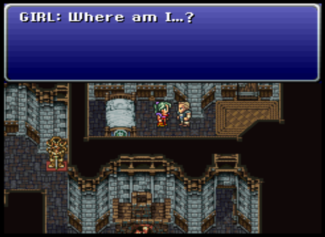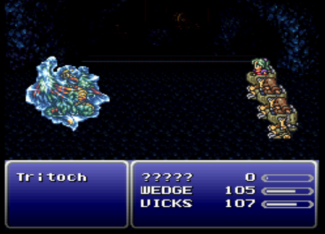Bastion
LQ: 9.15
Recommended Age: 10+
Skills Used: Planning, Working Memory, Mathematics, Reading

Amazon | Android | iTunes | SNES Classic Mini | Steam
Final Fantasy III, first published in 1994 for the Super Nintendo, is now also available (as Final Fantasy VI) on Android, iOS, Amazon, SNES Classic Mini (as Final Fantasy III), and Steam. (The two names for one game comes from the fact that in the US, this was the third game in the Final Fantasy series, but in Japan it was the sixth game in the series).
The storyline pits the Empire against the opposing rebels known as Returners. The empire has a technologically advanced army and experiments on magical legendary creatures called espers. The Returners hope to keep espers and magic from the Empire. The game features a large cast of characters that the player uses to create parties. Consequently, the player can swap out members as needed for a specific quest.
The ESRB gave it an E10+ rating for infrequent or mild cartoon or fantasy violence. At LW4K we stand by that rating.
*As a special note, please be aware that some versions are more in line with the original Japanese release. These versions have a T for Teen rating due to violence, sexual themes, partial nudity, and mild language. Please keep this in mind when choosing which version to let your child play.
Final Fantasy III helps kids practice and improve the following skills:
Adapting and adjusting to changing conditions and expectations.
As mentioned above, there is a large cast of playable characters. Each character has their own unique skills and attributes. This is important in Final Fantasy III because the player must overcome a large variety of monsters, obstacles, and puzzles. In the beginning of the game, for example, the player has control of a magic user and may become used to using magic to fight battles and solves puzzles. Later, it will be necessary to use Locke's skills as a thief, rather than Terra's skills with magic, in order to move forward in the game. This sort of change happens many times and, because of this, the player will get plenty of opportunity to adapt to obstacles and try new things. If they don't, they will find challenges become much harder than they need to be and may even reach a point in the game where they are unable to move forward.

Getting started and then maintaining attention and effort to tasks.
Final Fantasy III is a large game, with a wide variety of quest lengths. This makes it an excellent game for working on the focus-based cognitive skills.
There are small quests, battles, and conversations which may take only a few minutes to complete and which will provide the chance to improve sustaining attention on short-term tasks. On the other hand, there are times where a battle may last through multiple waves of enemies and require multiple parties engaging in the battle. There are also quests that will have to be put on hold to deal with a sub-quest. Both of these situations allow the player to work on sustaining attention on long-term tasks. Regardless of whether it is a short-term task or a long-term task, there will be many times the player will be asked to shift attention from one party or quest to another, and then back again. Of course, there are also the tasks where the player must complete a quest in a very short, limited amount of time (with a timer up on screen to keep the player aware of this fact). When this happens, they will need to be able to ignore external distractions (both in the game and in real life) and must be able to initiate tasks without procrastination. Regardless of which focus skill is being used, without them, the player will lose track of what they are doing, what their goals are, and how to move forward in the game.
Developing a systematic approach for setting and achieving goals.
Although it may be obvious at this point, it cannot go without saying that Final Fantasy III requires the player to use their planning skills. Problem solving is common in order for the player to make their way around and through obstacles. The player will also need to have a constantly evolving long-term plan for the game over all. How are they going to level up characters? What is the best party set-up for their specific gaming style? And even as they are making this long-term, over all plan, they will also need to have short-term plans for whatever sub quest they are currently working on. Without a plan, they may end up missing a vital piece of information or use up more materials than they need.
Understanding our own actions, thoughts, and feelings.
The nature of Final Fantasy III's swappable parties means that this is an ideal game for improving self-assessment and analysis. The player will need to evaluate each quest and figure out what skills will be required, which character has those skills, and whether or not those skills need leveled up before the quest can be completed. If the player does not engage in self-assessment on a regular basis, they will end up making challenges harder than they need to be--even to the point of being impossible--by not having the appropriate party composition.

Managing our actions, feelings, and behaviors.
All of the flexibility, planning, and self-awareness mentioned above means that, in order to be successful at Final Fantasy III, the player must spend a great deal of time thinking about the future. The player must consider what quest they have just been given, what terrain they have to go through, and even what type of a quest it will be (are they going to fight a battle or find a person, for example). Once they have considered these different elements, they will then need to consider which characters, equipment, and spells they should have with them. All of this is thinking about the future, and without it, the player will be unprepared for and unable to complete quests.
It is also important to note that some of the later quests can be very difficult. The good thing about this, however, is that it provides the player a chance to practice both improving impulse control and managing frustration and anger. If a player does not manage their frustration and anger, it can lead to unwise decisions that make it even harder to beat the puzzle, monster, or battle. Impulse control, on the other hand, comes into play before the puzzles, monsters, and battles. Sometimes the best option for a player is to hold off on the latest quest until they have had a chance to prepare. This may be completing a side quest, leveling up a character, skill, or spell, or even going out into the world to fight a large number of minor fights in order to earn gold to buy better equipment. If a player doesn't recognize these moments and control their impulse to immediately go after the "boss", then they will face defeat until they have gone back and done the necessary leveling up.
Recalling and retaining information in our minds while working.
Everything in Final Fantasy III is advanced by clues and outright directions given by non-player characters in the game. This means it is very important for the player to be able to follow directions. If the player can't pay attention to what is being said, and then remember it, they will end up very lost and stuck in a short amount of time. This game also provides multiple opportunities to work specifically on improving forgetfulness through having to remember a clue, sequence, or series of phrases in order to maintain cover or unlock a puzzle. There are even sequences of buttons that must be pushed in order to execute a character's special move. Failure to make an effort to remember things will result in failure of the game overall.
Final Fantasy III is all about the people: whether they are rebel or empire, what their skills are, and where they are headed. There is a lot of talking and story-telling in this game. If the player is unable to read, they will not be able to do anything in the game. Reading is a vital part of Final Fantasy III. If your child is not a confident reader, however, they can still play and gain all the other cognitive benefits of this game simply by having the support of a confident reader as they play.
All membership plans come with full access to our entire suite of tools learning guides, and resources. Here are a few of the ones we think you’ll like the most: